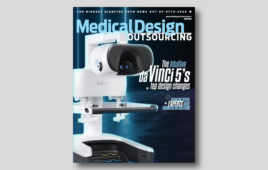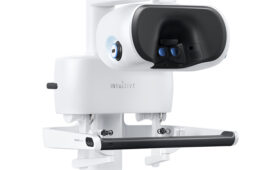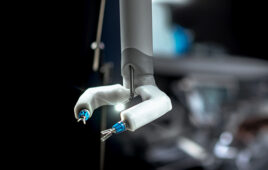
Chinese flag image is public domain.
A host of medical robotics outfits have emerged in China in recent years as companies seek to take advantage of the country’s growing need to automate medicine, GCiS China Strategic Research analyst Siao Tin Soh writes in Robohub.
China’s medical robots market was up more than a third in 2016, to 791 million Chinese yuan (equivalent to nearly $114 million). The market is expected to nearly triple to $2.2 billion Chinese yuan (more than $316 million) by 2021. (The full GCiS report can be requested online.)
Such robots are needed because China’s population is expected to rapidly age in coming decades, increasing demand for healthcare at the same time the labor force shrinks. Chinese health providers are using robots for surgery, rehabilitation, drug delivery and more.
Robots from major companies such as Intuitive Surgical can carry steep price tags, though. The situation has provided an opening for Chinese companies with more affordable alternatives, Soh said.
Soh thought five companies were especially worth noting:
- Beijing Tinavi is a government-supported maker of guided robotic systems for orthopedic surgery. The company has robots in more than 10 Chinese hospitals, with its GD-2000 model presently selling for $5.4 million Chinese yuan (about $777,000).
- Beijing Bohuiweikang Technology is the creator of the Remebot stereotactic robot system for neurosurgery. The Remebot’s six-axis robotic arms and CT/MRI compatible visual imaging are meant to improve the accuracy and reduce the invasiveness or neurosurgical procedures.
- Midea-Yaskawa’s goal is to bring a range of rehabilitation and nursing care robots to the domestic market. Chinese appliance company Midea and Japanese robotics company Yaskawa announced the joint partnership in 2015, officially launching it in March 2016 in Guangdong Shunde.
- Chongqing Jinshan Science and Technology’s gastrointestinal medical devices include capsule endoscopes—pill-sized cameras meant to take pictures inside of the digestive tract. The company started selling its first capsule endoscope in 2004, receiving U.S. FDA approval in 2008.
- Shenzhen Sanggu, a subsidiary of the Silver Star Group in China, develops and provides intravenous infusion monitoring systems and intravenous robots.
[Want to stay more on top of MDO content? Subscribe to our weekly e-newsletter.]




